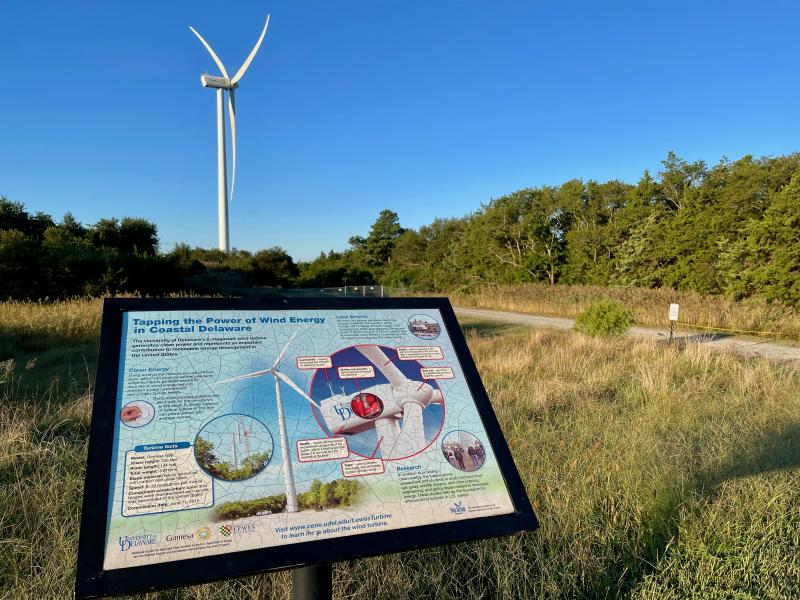State legislation designed to bring wind power to the region by overriding a Sussex County Council decision to deny it moved out of committee June 2, setting up a Senate vote when the General Assembly returns.
Senate Bill 159 would allow US Wind to operate off Maryland’s coast with lines running into a substation next to the Indian River power plant in Delaware. It would bring 1700 MWs of power to the regional grid. Regional grid operator PJM Interconnection estimates 1 MW can power 800 homes.
In December 2024, Sussex County Council denied a conditional-use permit for the substation, three weeks after the planning & zoning commission had recommended approval. A lawsuit filed by US Wind contesting the county denial is now in Superior Court.
Sen. Russ Huxtable, D-Lewes, co-chair of the Senate Environment, Energy, and Transportation Committee, said ideally he would like the court to make the final decision allowing US Wind to proceed. But by all indications, the bill is being fast-tracked for legislative approval before the end of session June 30.
While leaning toward approving the bill, Huxtable said he is still listening to both sides – local control supporters and wind power advocates.
“The bill’s not very long at all, but it has profound impacts on what we’ve asked our local governments to do and also for residents who need more reliability and supply,” he said following the nearly three-hour hearing at Legislative Hall. “I’m hoping the power of the judicial branch will make this [legislation] unnecessary … I still want to have some conversations with people, but I’m more leaning toward it than I’m leaning against it.”
Huxtable has voted in support of local control in the past – most recently against a state bill to override a Sussex County decision limiting retail marijuana establishments – but in US Wind’s case, their application should fit in with the heavy industrial zoning next to the power plant, he said.
“This property is adjacent to it, it’s zoned heavy industrial. It should have been approved, but they disapproved it because of where the energy is coming from,” Huxtable said.
Speaking during the hearing, Sen. Brian Pettyjohn, R-Georgetown, a member of the committee, took a strong stand in support of local control in his opposition to the bill.
“This is going to affect local zoning decisions for a long time to come because we’re casting the mold right now that if the state doesn’t like what a county does – or it could be a town leader as well – then we’re just going to pass a piece of legislation to override it,” he said. “And that is not the way things should work here in Delaware.”
Pettyjohn also took issue that no one in Sussex County was consulted when the bill was written. Democrats hold a supermajority in the state Senate, and are close to a supermajority in the House. Statewide Democrats control all elected offices from governor on down. All but one Sussex County Council seat are held by Republicans.
In answer to Pettyjohn’s questioning, committee chair Sen. Stephanie Hansen, D-Middletown, the bill’s sponsor, agreed that even though the bill does not mention Sussex County by name, it is directed toward the county.
“For us as a state government to say, ‘Sussex County, you don't know what you’re talking about, we know better than you’ is extremely insulting to them,” Pettyjohn said. “It’s extremely insulting to the voters of Sussex County who voted those five members in, and it’s extremely insulting to the administration of Sussex County who have drawn the line and said this is not something we want in Sussex County.”
The conditional use was denied by a previous council. Three of the five council members have changed since that decision.
Pettyjohn said conditional-use approval, which was recommended by Sussex County’s Planning & Zoning Commission and later denied by county council, is not guaranteed. Sussex County Administrator Todd Lawson said that while county council does not regularly rule against a commission recommendation, it is not unprecedented.
“It happens, but not often,” Lawson said. “The buck stops with the county council and the elected officials. If they have a particular view on something they will vote their way, and it sometimes goes against the planning & zoning commission.”
He said applicants for heavy industrial zones typically have much larger footprints than the wind project, using poultry processing plants as an example.
Residents speaking during the public comment portion of the hearing were against the bill by nearly a two-to-one ratio.
Sussex County leaders were among those opposed.
Dewey Beach Commissioner Paul Bauer, speaking on behalf of Delaware League of Local Governments, said they support home rule.
“Local decisions must be made at the local level, period,” he said. “People locally are opposed to it. This decision was lawfully made at the county level, and is currently in the court system. Why are we even proposing a bill that is going to overtake local home rule, but go around the court system. When did land-use decisions become state rule?”
Gene Dvornick, Georgetown town manager who spoke on behalf of Sussex County Association of Towns and also the Delaware League of Local Governments, said he and the groups he represents oppose the bill because it usurps local control.
“Local governments are more familiar with their unique needs, geography and character of their communities. Zoning decisions are made locally and are often more responsive to residents' needs, concerns and values, and local officials are directly accountable to their constituents,” Dvornick said.
William Witham, retired Superior Court judge, said legislators should let the judicial process work out before taking action.
“You’re interrupting Delaware’s wonderful reputation as a jurisdiction to go to to resolve disputes,” he said. “This is a very bad precedent for the rule of law.”
Melissa Steele is a staff writer covering the state Legislature, government and police. Her newspaper career spans more than 30 years and includes working for the Delaware State News, Burlington County Times, The News Journal, Dover Post and Milford Beacon before coming to the Cape Gazette in 2012. Her work has received numerous awards, most notably a Pulitzer Prize-adjudicated investigative piece, and a runner-up for the MDDC James S. Keat Freedom of Information Award.






















































